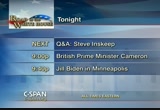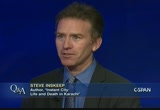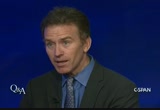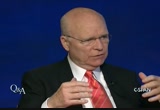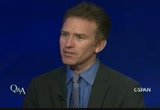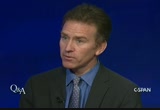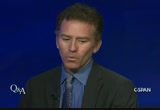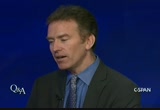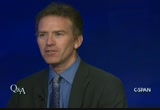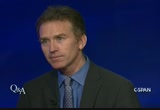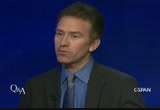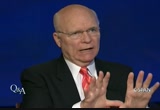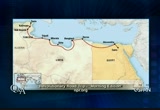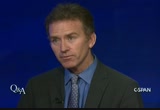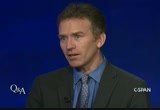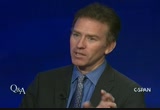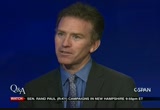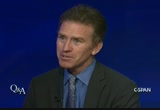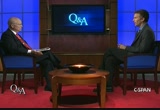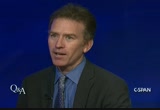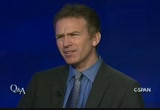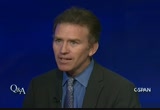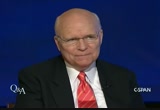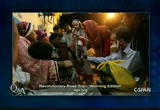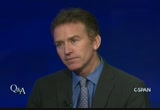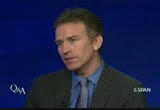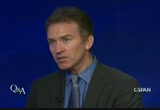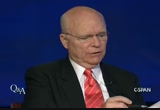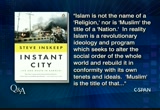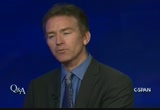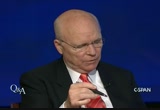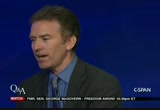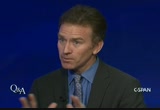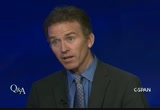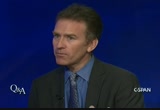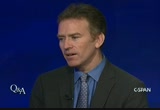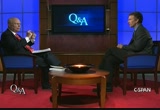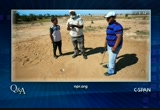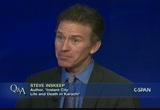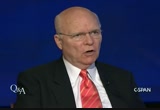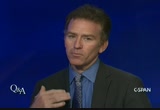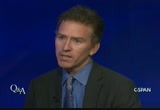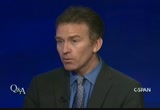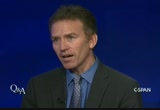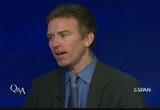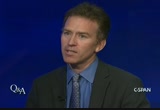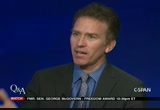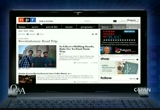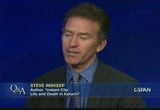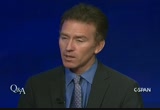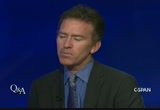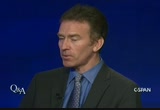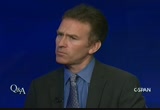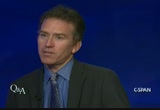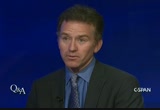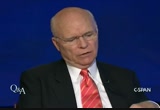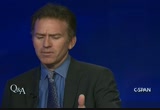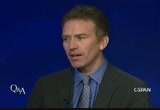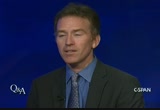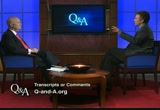tv Q A CSPAN October 21, 2012 8:00pm-9:00pm EDT
8:00 pm
scheduling information. a number of debates scheduled this week. coming up, we are going to check in with the three radio talk q&a with steve inskeep followed by the british prime ministers questions. later, joe biden campaigning in minneapolis. [captioning performed by national captioning institute] [captions copyright national cable satellite corp. 2012] >> this week on "q&a," steve inskeep discusses his book, "instant city: life and death in karachi." >> steve inskeep, when did you first go to work for npr? >> i had been freelancing a
8:01 pm
while, and hired me to cover politics. i would cover anything that needed done that nobody else would do. on my first full day there, i got on a plan to cover the new hampshire primary. i have been doing it ever since. i have been sent to cover plant cresses, wars, and i really enjoy myself. >> why radio? >> ipad started in high school in radio. my brother got on staff. i figured if my older brother could do it, i could do it. i got on staff. i called football games and basketball games. in college, i got paid $10 a game to the demand for high school and football games, i
8:02 pm
discover public radio at the same time. i was more of a news guy. i fell in love with npr in particular. i had a saturday morning shift in kentucky. i had to get up, go in, turn the radio on and put on national programs on the air. i got to sit there and listen to scott simon, weekend edition, for two hours. he is a brilliant broadcaster. i got to hear twice how he would conduct an interview, how he would write, how he would put a picture in people's heads. it was brilliant. i have read this in one of your articles or books that it
8:03 pm
mattered to you when somebody recognize your voice. was it a young girl? >> that is right. i was on an airplane, on my way to karachi to do some of the research for this book. we were boarding the plane. i changed planes. someone tapped my shoulder. it was a teenager there. she said, are you that guy from npr? i was. she introduced me to her mother, the one who really wanted to talk to me, who had sent her daughter over to get me. i sat for part of the time next to them on a flight. they had a lot to tell me. she was a woman, currently living in texas, and she had grown up in the city of karachi. i had done a series of radio stories from there. she remembered them. she was an npr fan and a person
8:04 pm
from karachi. she was listening intensely closely. she was still from there, in a way. she said, you did fine. you got the news. there was so much more to say. you needed to get more. i was happy to hear her say that. that is why we were going back. i reported from karachi several times over the years and i got more interested and wanted to learn more. there is so much happening. >> the paperback edition of your book is out. what was the origins of this book? >> it grew out of the radio series i mentioned in 2008. i had first been to karachi in 2002. i was assigned to spend time there, the first tory i covered
8:05 pm
thei was the death ofre "the wal street journal" -- there was the death of a "wall street journ al" journalist. i heard some of the stories of the people who lived there. i became fascinated with how the city looked. there would be these pieces of british architecture from the victorian era. there would be massive neighborhoods of concrete block homes where millions of people lived. i was drawn into the story of the place. i had been covering cities of different kinds all my career as a journalist. i went to the university in kentucky, but also spent a year in new york.
8:06 pm
i was assigned to read a book, "the power broker," about robert moses. i was so fascinated about the city around me and the ways it grew and changed over the years. that has informed almost every kind of reporting i have done ever since. many different stories i have done over the years are basically about cities. even my reporting in afghanistan was about a city and how it was changing under extraordinary pressure. i wanted to take a city somewhere in the world that exemplified the way that a city grows and changes, the way our urban world is growing and changing, most of the world's
8:07 pm
populations live in cities now. i wanted to pick one city i could look at as its own world. it is so large an absorbing an interesting that it is like a snow globe. it is a self-contained world where people have these intense experiences in stories that involve each other that are about each other that i wanted to learn. you say hello to them in a place like karachi. an amazing and heart wrenching story comes out of them. i wanted to take one example of the way our urban world was changing. this sounded like a great example. the more i learned about it, the more i felt it was a good one. >> i am the co-host of "morning edition" on npr. i get up about 2:45 in the morning. i get into work at 3:45.
8:08 pm
the show goes on the air at 5:00. in syria, i might get out around noon. sometimes, 2:00 p.m. sometimes, it will be a long day. sometimes there is a presidential debate in the need to be there during or after the debate and you were crazy hours and sleep on the couch. the compensation is i can slip away and go see my family or held my life with something or take time to write my book. it varies from day to day. it is a conflict -- constant process of time management. when you work in jobs like this where you are paying attention to the whole world, really, your entire life becomes your work. you might be reading an article or hear something in conversation, you might watch a movie, anything might happen to you discover a story.
8:09 pm
renee, who is in las angeles, is doing the same thing i am doing, only three hours sooner. >> why is she there and you are here? >> why? that was a decision by npr i thought was very meaningful. we cover a lot of washington news. it is important for us to get that story right. we wanted to get a broader sense of the country. we have stations in every state, stations in every corner of every state. we feel we have done a better job than a lot of organizations of covering stories in indiana, or kentucky, were nebraska, but we wanted to do more. by shifting half of the program, one of the hosts, some of the
8:10 pm
los angeles -- angele ever colleagues in california are on a screen at their own table 3,000 miles away talking. they have a different perspective on things. things that seem important to us in washington seem irrelevant there. the reverse can be true. it is great to have a conversation back and forth. correspondents based in places like chicago, we have full time people in new orleans for a couple of years after katrina, and having people in different places just really enriches the conversation and the range of stories you can do.
8:11 pm
>> one of your radio reports, so people can hear you, this is on the road. we will find out afterward. [video clip] i am standing on the ruins of carthage. this city was the capital of an empire, destroyed by the romans more than 2000 years ago and rebuilt before it fell into ruin again. what we see are a couple of stone columns and the foundations of ancient buildings. we came here to begin a journey along the coast line through libya, egypt, and we are watching as nations rebuild themselves after the revolutions known as the arab spring. we are talking to the new president of indonesia.
8:12 pm
>> is it fair to say you face the job of building the government almost from the foundations? >> yes, of course. happens when you have a dictatorship, it destroys the social system, like the press. this will take a long time. >> that is the new president who works in the same palace where a dictator ruled this country for more than 20 years. >> where were you. ? >> tunisia. we went from there through libya to cairo over the course of three weeks -- two -weeks. try to follow up on the events of the arab spring. story that compelled
8:13 pm
world and was a great interest to me. i had been in egypt before. i wanted to understand the next chapter of that story. the tv cameras were there in different places around the arab world. there was a story that was at least as important going on at that moment. i want to get a glimpse of 's lives.p t we had contact along the way. a great deal of that trip, buys it -- by design, was improvisation. who did we need and what did we see? >> how did you travel? >> by a series of cars. we had a driver in each country. you could drive overseas in a conflict zone or a troubled country, but you would not be wise to do that. a local driver who knows where he is going and talks with the armed men at checkpoints and says hello to them and smooth
8:14 pm
things out -- >> need people with you? >> one producer, one photographer, a driver in each country, and an interpreter in each country. it is a carload or a van load. with that group of people, you keep going. sometimes we go hundreds of miles a day. sometimes we would spend several days in the same city. each day, we were trying to build on what we learned about how democracy was evolving, if it would be appalled at all. there were security problems in all three countries. we were looking for the heartbeat of these places. >> what is the first thing you tell somebody they want to do that you did? >> i would say go ahead. >> is it expensive? >> of course. especially if you want to do it
8:15 pm
quickly and securely. you need to look for a decent hotel to spend a night. and you need to hire people to take along. >> security? >> you do not worry about security. you do not take security. you do not take a bunch of armed guys. some journalists and tv crews who have a lot of expensive equipment may well do that in certain situations. the thing you do is get into the vehicle, go where you are going, introduce yourself to people, and people take care of you. even in a conflict zone, a war zone, in a country where the united states may be very unpopular, people will relate to you as a human being. there will be local cultures of hospitality that take over and effectively protect you. you rely on your fellow human beings to look after you. often, as a foreigner, i am better taken care of by people
8:16 pm
in many places than if the same people i and interacting with were dealing with locals. >> what was the reaction to you as an american? >> it was ok. people are eager to meet an american, even when they are not happy to meet an american. they are polite. there was an occasion where i went to afghanistan to sit with a man who had been a notorious -- he was accused of being an opium trafficker. there was little doubt. he did not want to talk or see me. but it is afghanistan. i am his guest. he has to offer mitme tea. they spent the whole time complaining about the united states. this was 2002. even though they were very
8:17 pm
angry, they were going to give mime tea. i was going to walk away and be fine. people respond to you in that way. most people are friendlier than that. most people invite you home and have a lot want to say. it is as if in many cases people had been thinking about the united states a lot. probably a lot more than we think about other countries. even though i am not an employee of the government, i am not an ambassador, it is as if i am the ambassador. they want the united states to know something. what their lives are like. they may have a specific message about a specific american policy, but they are very courteous and often are really energizing to meet. >> you said earlier you are from indiana and you went in to kentucky to college.
8:18 pm
>> i heard about it through various ways. they are a university that was founded in the coal mining country in eastern kentucky. the daughters who were coal minors had gone there for generations. they wanted more out-of-state students. a more diverse student body. they invited people from out of state. i had an opportunity to come and do that. it was very different from indianapolis where i had grown up. i was honored to have that experience. >> i ask that because here you are in tunisia and egypt and libya. afghanistan? iraq? >> that is right. >> where did you get this interest?
8:19 pm
>> i think i got it from books. i grew up reading a lot. my parents were both teachers, public school teachers in indiana. my mom taught english. my dad was a coach and athletic director. my mom in the school system i grew up in and my dad in indianapolis, two really big school systems. athletically successful school systems. the local folks are really proud of. and they were academically really successful. i grew up reading a lot. i would read about wars, pirates, and different parts of the world. the british empire. the old west. because i love that and i grew up curious, and i wanted -- i wanted to see more and more.
8:20 pm
i had done a fellowship and went to columbia in the 1990's for a little while. i had not really covered a war until after 9/11. they needed an extra person in afghanistan. they sent me in november 2001. was terrifying. -- it was terrifying. each trip i have taken ever since was as terrifying to contemplate going to a place in conflict. of cawnpor when you get there, you are so busy working and so absorbed in what is happening that it is not scary for a while. they build up after a while, at the spent some time -- after you spend some time in difficult situations. it is energizing to get there and cover a story and feel like you are doing something important.
8:21 pm
you feel like every single fact you are able to get out to the world is really important. >> you mentioned the book on robert moses. is there another book before we go to another clip that has a big impact on you? >> i read the book again and again, a deep pit -- a detailed explanation of how the government works. the war in vietnam. all the present cost -- president's men. an amazing piece of reporting. >> business club is only one minute long. i want to mention difference -- the difference between radio and television.
8:22 pm
[video clip] >> liquor is a flashpoint as islamist gain more power in indonesia. we have turned store -- heard stories of liquor stores forced to close. at our hotel, and still another town, the staff informed us they shut down the bar after a religious conservatives complain. some barings remained open, like a dim bar. "killing me sofly" played on the sound system. friends are here with a tunisia- made beer. the bar is near plot -- a near a place where protesters brought down the last ruler.
8:23 pm
islamists are ruining his dream of a free to nietzsc tunisia. >> why did you name the bar jfk? >> i do not know the answer to that. it suggests the cultural interaction there is. >> what is the difference between writing for radio and writing for television? >> we need to focus in radio. it is true of print, also, on putting pictures in people's heads. what color was the beer bottle. how diem was it in there? what did the guy look like? you want to include just enough detail so people feel they are there. if you do it well, it can draw people in the way a novel draws you in.
8:24 pm
>> in your book, there is a subtext to everything you do on the "revolutionary road trip." >> that was in may and june, 2012. >> your book was written in 2008. it first came out -- >> 2011. >> the subject is about ins -- islam. you write about a guy. your pronunciation of all of these things as a complement. how do you do it? it looks like it is without effort. >> i am glad it looks like it. you make an effort and sometimes you get it wrong. sometimes it is basic words. arabic is a varied language and there are so many dialects and different pronunciations.
8:25 pm
>> this is the page you talk about islam and the difference between jan and now duty. >> he was a lawyer in the time where pakistan was part of british india and part of the long fight for independence. he was a secular politicians. i do not believe he used that word. he gave a famous speech in which he said to this country which was mostly muslim but had millions of hindus and many other kinds of people, that the state has business that is separate from religion. you were free to go to your temples, you're mosques, but they are separate. we are not going to discriminate
8:26 pm
based on color, cast, or creed. it was an amazing the progressive speech in 1947. it would have been an amazingly progressive speech in the united states at the time. that was one vision of how to have a majority muslim country. the other vision is represented in my book and i believe in history by the founder of a muslim party, and the islamist party, that remains in pakistan today. it is powerful and has spawned other parties over the years. you could call him a fundamentalist. i do not see that word used in this period, either. he believed people should follow the clear commands of islam, the basic commands, and not go beyond that.
8:27 pm
>> let me read what you quote him as saying. he offered a sweeping view of 1939. >> that was part of his innovation. this is a guy in the mid-20th century, where there are all these leftist revolutionary movements of the world, and he grabbed their language and techniques, and i believe, in the speak -- the speech to which you refer, he goes on to say this is not a religion i am talking about. let me read that and we will put it on the screen. he is no longer alive? >> no. >>
8:28 pm
>> of that is the way they are thinking? >> the rhetoric has changed. the ideas are still fundamentally there. you still have the conflict between someone like jinnan, who is thinking of muslims in india as an ethnic group, and thinking of creating a state that muslims will have political power over but the state is not supposed to tell them what to do. by necessity, because it was an extremely diverse place, he was
8:29 pm
opening the state would make room for hindus, and various other groups that were very important to pakistan and remained important ever since. he was thinking in terms of statehood. mawdudi was thinking in terms of global revolution. to what extent, we could argue that. updudi's party ended contesting elections in pakistan ever since. they have made themselves part of the democratic process. they have not been violent extremists. at least the leadership of the group, in the way other people have been. they are thinking across national boundaries. they have rhetoric that goes across national boundaries. they demand that everyone within their reach behave a certain way. that is a very different way of thinking about the world. >> you jump ahead to page 158.
8:30 pm
you mention somebody we talked about a long time ago on this program. an egyptian scholar. he endorsed violent struggle to remove leaders, his writings would influence al qaeda and other groups. trained somewhat or educated in colorado? >> yes. >> you jumped to muhammed. help us out on this. are we creating this problem when people come in here? >> no. i do not think that is the case at all. when you look at specific instances, yes. some people have gone and had negative reactions to the united states and come back. there is a kind of genealogy of radical thought which scholars have uncovered and which i right about here but not quite --
8:31 pm
cannot claim any credit for uncovering. some radical thinkers all the way forward to osama bin laden, gradually getting more radical as you go. part of that has been conflict -- contact with the rwest. but radicals do not need to come to the united states beef -- in negative have radi opinions of the united states. their propaganda is enough. people feel they are colonized, they are dominated by the united states, there is a media which will play on those sentiments and there is an army that is very influential in the country, and when it is to their benefit, when they see a benefit, they will whip up anti-
8:32 pm
american sentiment. is there. but it will be used to make political points. if you are fighting in pakistan and your opponent is attacking the united states, attacking the united states is a way to attack them. there are genuine concerns, as well. >> i will move to libya quickly, but what is the one thing you remember most about tunisia. >> the openness of the place. you could go to a bar called jfk and order a beer. that openness in many ways is under threat. alcohol is one thing. has become a symbol four people. islamists have been closing down liquor stores. that is one aspect of life. it is a stalking horse for many different ways people are
8:33 pm
arguing over the role of islam in government, the rights of women in society, the ability to behave different ways. it is a place where what we would think as western or universal values are dealing with very particular and religious concerns. >> back to pakistan, you wrote in "the new york times" about a movie theater that was shot down were burned down. there was a philosophy from mahomet it is on? >> that was an incident that troubled me. i was grateful at the time to publish that. it was something i had something to say about. i had gone to visit it. it had been there since 1947. the founding year of the country. it showed films from all over the world, from the united states to england, bollywood to india, and, to me, it symbolized the resilience of the country and the openness of the
8:34 pm
country in spite of all of the violence and trouble people have suffered in the last many decades in pakistan. during one of the protests against a video that insulted the prophet muhammed, people turned against the movie theaters and burned them. i do not see that as a protest against the west. i do not see that as a protest against the united states, even though avatar was one of the movies you could have gone to see at this theater. you had islamist activists who had not like these movie theaters for decades, way before this profit, and foam, which was never shown in them anyway, so they grabbed an opportunity to attack. they whipped up a bunch of young people, and there were teenagers involved who stole sodas from the snack bar on their way to
8:35 pm
burn this movie theater, and i argue in that piece that what they were really attacking was the nature of their own country, which they did not understand. i said that with the greatest respect. who am i to say what your country is about? but i do know having studied the history and having listened to pakistanis themselves, that it is an incredibly diverse place. it is an even more diverse place than it is today. lots of different cultures and traditions and different ways to be. that movie theater symbolize pakistan. that is what burned. >> the difference you found in libya, this is from your web site, npr, some still pictures to show. it is about golf, libya. >> yes. [laughter]
8:36 pm
>> what did you take away from libya? >> sunday, it ought to be an awesome tourist attraction. wonderful people, and it is beautiful. it is an energetic country and it has so much potential because it has so much wealth. it is a troubled country but it can be an amazing place. >> who took these pictures? >> a photographer who traveled along with us. [video clip] we stop the car on a highway and step into a different world. kids playing golf in a wasteland. >> wow, he got all of that one. right up near the flag. >> because there is no grass on this course, the players bring their own. each person brings a square of
8:37 pm
artificial turf for each shot. he is a coach of the junior national team, which includes his son. >> a good stance, very relaxed. feet about shoulder with. that is beautiful. what do you want to do when you grow up. you want to be a pro golfer? he is the second-greatest player benghazi and he is 12. do you have a favorite golfer? >> tiger woods. >> ok. oh, right in the hole! >> where did they get the interest in golf?
8:38 pm
>> i do not know where it came from. it is a global sport. we are talking about the mediterranean country. it is not so far from europe, where golf is big. it is awesome to see how eager people are to play that they are willing to go out and do it on a golf course without any grass. >> where did you find them? >> i just ran across them. i had heard there were such golf courses from the driver. i wanted to see a course and did not have time. i ended up finding this one in benghazi. a guy took me right there. you stop by the side of a highway and you step through this opening in the fence and there you are. it is very rough, raw, in the middle of the city, but it is its own world.
8:39 pm
>> you write about sharia law. we have heard sharia law mentioned in this country by politicians as something to worry about that they will try to bring it here. put mohammed into perspective for somebody who has not ever really read about him. >> let me not speak as a religious scholar or as an expoert. that is essentially religious law. it is what muslims are told they need to follow. it is important to realize there are many different interpretations of islam. what does that mean for different people. what does that mean for non- muslims? in the end, as i have learned it from listening to muslims, islam is a fairly simple religion. there is a relatively limited number of basic commands that allow you to call yourself a muslim if you follow them. it is a rather straightforward
8:40 pm
religion in that way. it can become profoundly intricately complicated. there can be endless numbers of rules. but i have been impressed by the average scholars who know this far better than i to attend to disentangle what islam is from various cultural traditions and tribal traditions that have grown and build up in different ways. there are people in different parts of the world to have extraordinarily detailed and complex rules they are convinced they must follow and other people should follow. the taliban in afghanistan. i am not sure the career on ashley says that. i am not an expert. there are many debates within islam as to its meaning. there are many debates that are really not islam against the
8:41 pm
west. there are muslim against muslim. i think of a great scholar whose writings have been very informative to me and who is in washington d.c. who will talk about the way sudanese and she as, two of the great sex of islam, sometimes worked together and have sometimes for political reasons pushed apart and you have an incredible constellation of beliefs. i think it was very well understood during the administration of president george w. bush and remains well understood by this administration, the obama administration today, that it is a challenge of the united states to make sure we do not get played, do not get positioned, so we think the enemy is 1 billion people in the world to have this religion.
8:42 pm
it is a small minority of people with whom there is a problem. there are larger numbers of people who have deep concerns about the united states with whom the u.s. needs to figure out the proper way to engage. it is a religion that many people have practiced in many different ways and, in that way, it is almost like any other religion. >> this is a question i can get in trouble with. why do they believe in mohammed? where does that come from? >> why do christians believe in jesus? >> same question. what you saw, up close. >> that is a tough question. there are people who fall away from that belief. i remember a man i spoke with in pakistan walking together away from other people. he said, i am an atheist. i cannot tell people that, here.
8:43 pm
there is a cultural pressure to have a certain kind of belief, a certain set of beliefs. people come to that faith in many different ways. some people grow up in it, some people know the history, some people become very absorber in specific rules they have to follow. >> if somebody in your home town said, you have to be a muslim -- >> i will not do that. >> if you did, how would their life changed? for our inshore real lot and all that. give me some examples. >> let me mention a slightly different example. it is not far away. i have a colleague at npr who is origin.stani or she dresses differently, covers herself up in a different way.
8:44 pm
that is a very large part of her life. being in the united states, she is a woman, she can address how she wants. there are muslim women who dress any way you can imagine in many different parts of the world, including the united states. she makes a choice to address a particular way, feels that is religiously important to her, but is showing up for work, is married, has a home, is participating in society, is extraordinarily smart and well educated, so she has found an american way to integrate this religion that is foreign and strange to many people, and break this religion into an american life. you could say her vision of islam is compatible with the vision we discussed when we were talking muhammed ali jinnan, a muslim who believes in the state
8:45 pm
of religious freedom rather than imposing religious restrictions. >> how much religious freedom is there in karachi today? >> less than there used to be. there is still religious diversity. you will recall that indian pakistan -- india and pakistan were split. there were millions of hindus inside pakistan. karachi is a historical the hindu city. some -- the majority fled. some remain. i doubt anybody could accurately count them. could be hundreds of thousands, it could be millions. people practice different religions. if you are not a particular kind of muscle, you can be harassed or worse. >> in indonesia, religious freedom? >> there is. there is an openness to the
8:46 pm
united states. people apologized for recent protests against the u.s. consulate. there are a variety of beliefs. one of the biggest challenges to religious freedom in muslim countries right now is faced by muslims, people who are a shias, whoect, she are banned from calling themselves muslims in pakistan. one of the greatest threats to religious freedom and religious tolerance in the muslim world is placed by muslims who are intimidated or terrorize by people who want to impose their own version of the religion on them. >> here is another report of yours in libya from your trip back to the middle of this year. >> the other day in benghazi,
8:47 pm
libya, we found people surrounded by a truckload o. they were shouting, god is great. we were driving to see a protest but the protest had found us. these people were the protesters. we continued on. they were demanding their country and pose sharia law. >> pronounced it the right way. >> i will probably get it wrong. >> god is great. do they say that because they believe it or because it is a slogan? >> i am sure people believe it. i am sure the guys who brought the guns to the demonstrations and sincerely believe they were
8:48 pm
calling for the right thing. they want to end islamist government. they want an integration between their version of the faith and the state. they brought guns mounted on the back of the truck to the protest. it has informed my thoughts about news events more recently in benghazi. you talk about political protest in a place where there are all kinds of militias who are more or less independent from the state. you have things that can happen very quickly and violently. in a political demonstration, even if it supposedly starts peacefully. >> we talk about tunisia and pakistan, what about libya? is it open? >> it is a conservative society. it might be 6, 7, 8, on a scale of 10.
8:49 pm
in terms of what you can get away with. women can go all around in libya with their hair uncovered, but you have to be careful about exactly where and when. gaddafi went back and forth with religion. they were more leftist and modernist in the early years of the gadhafi's regime. he made a point of having women around him and female bodyguards. it was basically a conservative society based in many ways on tribes. that continues to be the case today. this is a really interesting example. it is a really conservative place with islamist groups with a lot of militias, yet there are people who have elected what may turn out to be a rather interesting government who seem to be eager to have a relatively open society and who in a limited way made room for
8:50 pm
different kinds of people right now. the jury is out as to where this will go. >> how did you do all this? how did you write a book about karachi? how did you make a three-week trip over there and continue to be the anchor? where do you find the time? >> i have a very forgiving wife, that is the first thing. my wife has taken great care of me and my family. the author of some reference books on genealogy, i am very proud of her. she has been very tolerant. i have great colleagues, and there is a group of people at "morning edition" and at npr who have believed in things i wanted to do, have worked like crazy to make them happen, and i think about this trip across north asti -- north africa.
8:51 pm
you want to get across as quickly as possible. i do not know how exactly how fast the driver was going. we may have been going 100 miles per hour and you are still writing the story you want on the air in a few deedays. the photographer is there and we are working and you realize, we might be going 100 miles per hour here, but we are flying across the desert, and then a tire blows out and we have to stop and get it fixed. you realize you are in this environment where anything can happen. metaphorically speaking, there is no seat belts even if you are wearing a seat belt. there are people who come along with me to do that. there are npr colleagues who have taken far greater risks than i. someone was in libya during the
8:52 pm
early stages -- days of lydia's revolution. it was extraordinarily dangerous and uncertain. you're rely on other people. you ask other people for help. i collaborate with a lot of people. if i am doing my job correctly, i should be listening to the people around me and embracing their best ideas, even if they are a little scary to me. once in awhile, that has happened. >> a couple years ago, lived through some controversy -- npr lived through some controversy. >> in the end, it has made npr stronger. the network was criticized for .he w
8:53 pm
a lot of claims were made that were factually untrue. there was a claim there is only one black man working at npr. i would look around and there were three african-american program hosts out of 10, there were black women, there was an african-american person. there were a variety of people. an incredibly diverse place. not as the verse as it could be, but better than a lot of media organizations. the people of different countries and ethnic backgrounds. you have somebody who went to harvard and someone like me. you have somebody from upstate new york, someone like me from indiana. a lot of different kinds of people. this character was drawn. in the end, i think it's strengthened us. you realize after a while that, people are going to say what
8:54 pm
they will say and you need to do your duty and your job. i believe we are doing something important for the country to try to get reliable -- reliable information to people. it does not matter what anybody says. the second thing you realize is there is tremendous support for what is being done, even in a situation where, by the company's own admission, they poorly handled a very public situation. even in that terrible circumstances, there has continued to be tremendous support for what we are doing on the air. we heard from the public and we continue to hear from the public. it is a system all across the country that only exists because volunteer to pay for it. if people did not do that, it would be out of business tomorrow. that support continues.
8:55 pm
>> how concerned are you a faction of government will come again.npr what impact would it be on npr if the federal money went away? >> two different questions. there will be people who are on nappy with individual stories we do, with how npr is set up. there is a small percentage of federal money and go suit local stations which in turn broadcasts npr programs. i have to put that aside. and let people make their own decisions about that. i have to focus on the job i have to do. if people have concerns about a specific story, i always want to hear that. i do hear that. people will send the eighth me a tweet.
8:56 pm
i think you are -- "i think you are missing an important story here." you take those suggestions. if people have specific concerns, it is always great to hear. when people make a broad complaint about bias, and cannot come up with a specific example of what the problem is, then there is not much for me to do to deal with that. i respect their concern and their opinion, but we need to have a discussion about things that are actually on the air. frequently, when they go to the transcript of a story that bothers people, the transcript enters the concern. you discover that things are different in that transcript than people have perceived. >> how long do you keep wanting to get up at 2:45 in the
8:57 pm
morning? >> as long as they let me. i have a contract for a few years longer. it is probably not a job you can do forever. but you need a lot of interesting people. i am working on another book, i have a contract for another book on history. it involves andrew jackson and indian removal in the 1830's, the forcing of tens of thousands of native americans from the eastern united states in the time of the president and redaction -- president andrew jackson. i am supposed to finish it within a couple of years. >> how long have you wanted to tell it? >> it has been on my mind for the last couple of years. i am fascinated for the 1830's, for a long time. i have become more interested in it recently because we have had difficult politics in our time. there were very difficult
8:58 pm
politics in the 18th -- the 1830's. >> you can go to our website and look for the steve inskeep show. there is more information. you can find your reports, the "revolutionary road trip," plus your book, "instant city: life and death in karachi." steve inskeep, thank you very much for joining us. >> it has been an honor. >> for a dvd copy of this program call 1-877-662-7726. for free transcripts or to give us your comments about this program, visit us at www.q-and- a.org. "q&a" programs are also available as c-span podcasts.
8:59 pm
>> see the presidential debate tomorrow night live on c-span, c-span radio, and c-span.org. watch and engage. next, david cameron takes questions at the house of commons. then, jill biden campaigns in indianapolis. after that, senator rand paul campaigns for mitt romney in new hampshire. tomorrow on "washington journal," jonathan tepperman journal," jonathan tepperman
172 Views
IN COLLECTIONS
CSPAN Television Archive
Television Archive  Television Archive News Search Service
Television Archive News Search Service 
Uploaded by TV Archive on

 Live Music Archive
Live Music Archive Librivox Free Audio
Librivox Free Audio Metropolitan Museum
Metropolitan Museum Cleveland Museum of Art
Cleveland Museum of Art Internet Arcade
Internet Arcade Console Living Room
Console Living Room Books to Borrow
Books to Borrow Open Library
Open Library TV News
TV News Understanding 9/11
Understanding 9/11